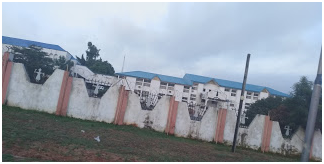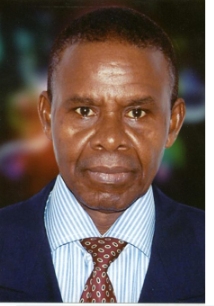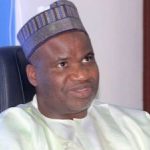
FEDERAL HIGH COURT, AWKA, UNDER EROSION THREAT
Mr. Nwafo
BY CHIMA NWAFO
Henry David Thoreau – an American philosopher and development critic – regretted that most people you meet on the street are actually sleeping. If not, he wondered why many are incapable of observing things happening around them. Still on the same perspective of sight, Helen Adams Keller, another American, the first deaf-blind person to earn a Bachelor of Arts degree (according to Wikipedia), once asked: “Is there anything worse than blindness? Yes! Eyesight, but no vision.” Centuries earlier, in response to a disciple’s question as to why he speaks to people in parables, Jesus, in Matthew 13:13 (KJV) quoted from the Book of Isaiah, saying: “Therefore speak I to them in parables: because they seeing see not; and hearing they hear not, neither do they understand.”
Although the foregoing instances centuries ago in the developed world, the sad truth is that they capture what one can say is a normal way of life in today’s Nigeria. Perhaps, we’re either so busy looking for what to eat; or too occupied talking and celebrating life so much that we can’t observe life-threatening anomalies in our immediate environment. Naturally, we look, but do we see? I doubt, because Cambridge Dictionary defines see as “to be conscious of what is around you by using your eyes.” Instances abound to substantiate the foregoing narrative. For example, we sell foods and drink around open drainages in industrial areas where effluents flow through the gutters from factories. Who cares? Neither the individuals nor government agencies! Littering is habitual or a way of life in our clime. As a result, plastic from sachet water, table water and other carbonated drinks are disposed off on the streets, inside gutters, and even inside office and residential complexes. Who cares? After all, the waste disposal agencies do not provide bins in public spaces. To urinate in open spaces, is a mark of “civilisation” or being a city-man. In fact, the rural migrant acquires such habit in the urban area. The so-called educated and travelled Nigerians return to continue in these uncivilized habits.
Our brothers and sisters in the Niger Delta go about their normal businesses oblivious of all the effects of the various pollutants and deadly fumes from oil exploration and production companies. Thank God for Ken Saro-Wiwa who fought the Federal Government and Shell up to the United Nations, and European courts. From Ken Ogoni youths imbibed the culture of environmental activism. Just ponder: Is there anything done to pollute Ogoni land that was or is not happening in other oil-producing communities. None! The only difference is AWARENESS. That is why the current effort of Bayelsa State governor is commendable. It takes boldness and real patriotism for a Nigerian political elite to confront multi-national companies on an issue of communal interest.

Romeo Barberopoulus, father of foundries and conservationist, was the founding chairman of Nigerian Foundries Limited and member of Nigeria Conservation Foundation/Nigeria Field Society. He was a Cypriot who came to Nigeria after World War II. Sometime in October 1993, we were travelling to a local council area of Rivers State, now in Bayelsa State, in his Toyota Land Cruiser, to see the bronze casters at Igun Street, Benin-City; Nana’s Palace, Koko and to picture a house built on stilt at a village in SAGBAMA for the Conservator magazine. Both of us sat at the back. As the journey progressed into Delta State territory, Chairman (as we called him) said: “Chima, have seen any bird flying around despite the green forest on both sides of the road?” It was then it dawned on me that I’ve not seen one, neither have I heard any chirping. At a waterside in Koko River, he asked some young people with canoes if they’ve caught some fish to sell. It was about 2.45pm. They answered in unison: “We never catch any fish since morning.” That is part of the price paid by fishing/farming oil-bearing communities due to the activities of oil exploration and production. To the average Nigerian elite cruising in the comfort of a Land Cruiser, what on earth will make him observe the presence or absence of birds in the air or forests on his way? Naturally, he should be sleeping or chatting with his mistress.
Even though he sees the trees and grasses flee past as the vehicle cruises, does that equal observing?
The answer is no, given that Dictionary.com defines observe as: “to regard with attention, especially so as to see or learn something.” First, you must regard what you’re seeing with attention so as to learn something. For a people immersed in the epicurean culture of “enjoyment” paying attention to details outside finance is as strenuous and undesirable as thinking and reading. We love easy life, short-cuts, and quick solution to issues. As Tai Solarin of blessed memory would say, we want omelet without breaking eggs. That is why millionaires who have travelled to developed countries build houses wherever they find space. It could be under high tension electric poles, oil/gas pipelines, telecommunication base stations, near erosion sites, with total disregard for drainages.
Alarmed by the identification of 1,000 gully erosion sites, Anambra State Commissioner for Works, Mr Marcel Ifejiofor, said most of the sites were caused by “wrong channeling of water,” regretting that “some people in the state intentionally build on water channels, which result in blockage of water flow.”
Explaining the effect of this man-made problem on soil compartment, he charged: “I want to visit Sakamori Drain linking water to Idemili River around Onitsha, because I got a report that the drain was blocked.”

Meanwhile, the people of Orumba North and South Federal Constituency in April last year called on President Muhammadu Buhari to declare a state of emergency in Anambra. Rep Ben Nwankwo, who led a delegation of the town union leaders, described the magnitude of erosion there as “war between erosion and the people as to who owns the land. Agulu-Oko-Nanka down to Umunze is the deepest gully erosion in the country.” In the absence of any figures to show how much is required to solve this gigantic challenge in Anambra, let’s move to Niger State, where the situation may not be as acute. In October 2018, Governor Abubakar Sani Bello, “approved the release of N300 million to the Nigerian Erosion and Watershed Management Project as counterpart funding, to help address erosion and flooding challenges in the state.”
Gully erosion/flooding is a major environmental problem in most parts of the country even though it is more pronounced in the South-east. As with other ecological encumbrances, the individual’s vision and power of observation in spotting threats to his immediate environment is as important as the millions of naira or dollar aid required to solve the problem.
*Nwafo, Environmental/Public Affairs Analyst, can be reached on: +2349065225130; chi_dafo@yahoo.com.

Share
your story or I Witness Reports with us 24/7 via: SMS: +234 (0)9076248001
Whatsapp: +234(0)8072022024, Email: gatmashblog@gmail.com
Website: www.gatmashblog.com
For advert placement, contact us today via email: gatmashblog@gmail.com or call our hotlines on Tel: +234(0)8072022024, 08166622444, 09076248001










